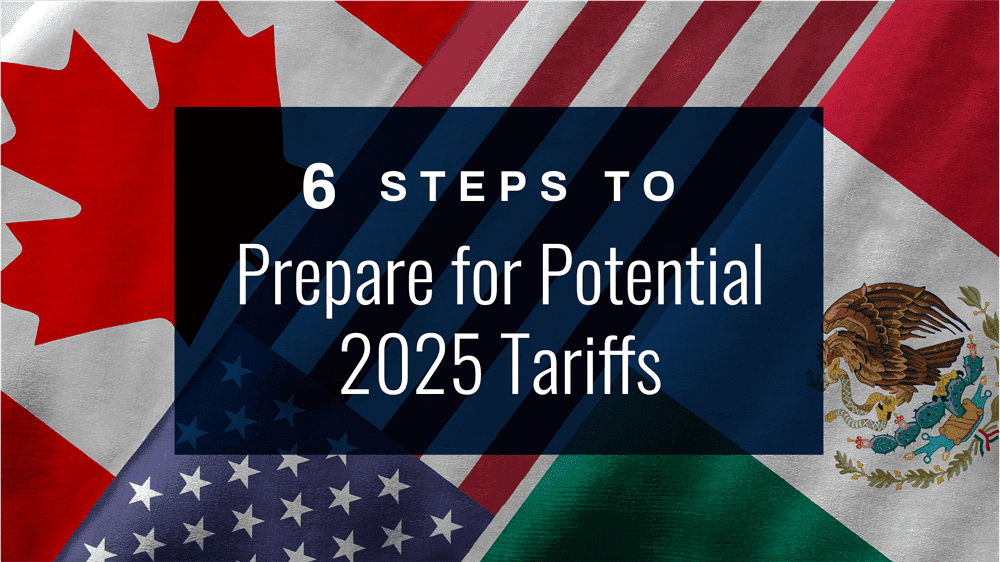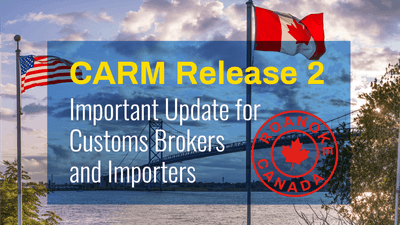January 09, 2025 | Customs Bonds
Managing Potential 2025 Tariffs: A Guide for Importers and Customs Brokers

By: Dennis Gates, Regional Vice President Northeast Region
The announcement of potential tariffs has sparked concern across industries. In November 2024, the U.S. President-elect proposed a 25% tariff on imports from Canada and Mexico. This move could significantly disrupt trade, particularly for goods previously duty-free under the U.S.-Mexico-Canada Agreement (USMCA). For importers and their customhouse brokers, these tariffs could bring significant financial and logistical challenges.
Understanding the Potential Impact
These proposed tariffs may affect a wide array of goods, from raw materials to finished products. Importers need to understand how these changes could increase costs, strain supply chains, and lead to retaliatory tariffs on exports. Customs brokers may also find themselves navigating increased complexity and heightened client concerns.
Steps Importers and Customs Brokers Can Take
- Stay Informed and Communicate Early
Knowledge is power. Importers and brokers should actively monitor updates on tariff discussions and assess their potential impact. Open communication between brokers and clients is essential to ensure everyone is aware of potential cost increases and their implications. - Evaluate and Adjust Supply Chains
Now is the time to analyze your supply chain for vulnerabilities. Importers should identify goods at risk of higher duties and, if possible, consider alternative sourcing options or renegotiating contracts to offset additional costs. - Establish ACH Accounts for Duty Payments
Importers relying on their brokers’ Automated Clearinghouse (ACH) accounts should establish their own ACH accounts to manage potential duty payments directly. Customs brokers should encourage this step to streamline payment processes and reduce risks tied to increased financial responsibility. - Advocate Through Associations
Advocacy is key to influencing trade policies. Importers should voice their concerns to industry-specific trade associations. Brokers can leverage local and national customs broker and logistics service provider associations to raise collective concerns and push for solutions that minimize disruption. - Review Continuous Import Bond Sufficiency
When tariffs are imposed, CBP may have to send bond increase demand letters to importers in order to ensure that their requirements are met. This can lead to stacking liability. Bond Stacking occurs when an importer has open (unliquidated) entries or open claims under its continuous bond for multiple bond terms, resulting in an aggregate or combined liability, i.e., “stacking liability.” This cumulative risk can pose financial concerns for both the surety issuing the bonds and the importer, as it increases the total exposure beyond that of a single bond.This situation can also impact an importer’s ability to afford or even obtain their bond. Accurate forecasting of total duties, taxes, and fees—including tariffs—on imports over the next rolling 12-month period is critical to setting the correct bond amount and avoiding stacking liability. - Plan for the Worst, Hope for the Best
Whether the proposed tariffs are implemented or not, preparation is non-negotiable. Importers should model potential costs under different scenarios and adjust budgets accordingly. Brokers should prepare their teams to handle increased administrative tasks tied to higher tariffs and client queries.
Potential Retaliatory Measures
It’s important to recognize that tariff increases often lead to retaliatory actions. Canada and Mexico may impose countermeasures on U.S. exports, affecting businesses that rely on these markets. Both importers and exporters should be proactive in assessing how these developments might impact their operations.
Final Thoughts
While we hope for a resolution that avoids significant trade disruptions, preparing for the possibility of increased tariffs is the prudent choice. Importers and brokers who take the time to evaluate, adjust, and advocate will be better positioned to navigate these challenges. The key to weathering potential policy shifts is a combination of planning, flexibility, and effective communication.
Take Charge of Your Tariff Strategy Today
Don’t let uncertainty disrupt your business. Whether you’re an importer or a customs broker, proactive planning is essential to mitigate risks and adapt to the changing trade landscape.
Contact our team of experts today to learn about our tailored solutions for managing your bond program, which will help you maintain compliance and mitigate financial exposure.
Disclaimer: This information is provided as a public service and for discussion of the subject in general. It is not to be construed as legal advice. Readers are urged to seek professional guidance from appropriate parties on all matters mentioned herein.













